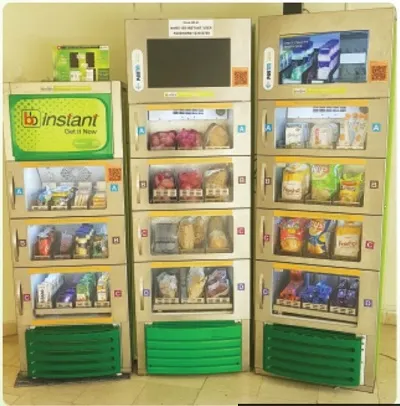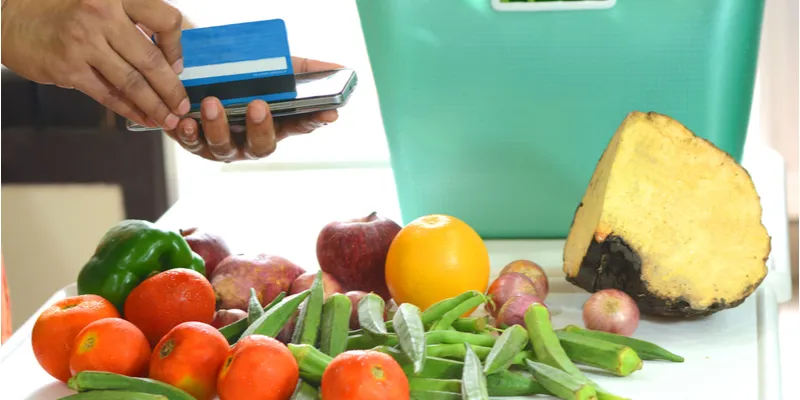Here’s how Bigbasket raised $150M to turn a unicorn, and this is what the grocery startup plans to do next
In March 2019, online grocery platform Bigbasket joined the coveted unicorn club. In an exclusive interview with YourStory, CEO Hari Menon reveals how the startup hiked up its valuation by building profitable growth, why it diversified into new businesses, and what the future looks like.
It’s not easy being the market leader when your opponent is Amazon, the world’s largest retailer, which comes with decades of experience and billions in its kitty. But eight years after its launch, online grocery platform Bigbasket has held its ground. The Bengaluru-based startup has stayed ahead of Amazon with its multiple grocery delivery models and Gurugram-based Grofers, which is funded by the likes of Tiger Global and SoftBank.
Founded by Abhinay Choudhari, Hari Menon, Vipul Parekh, and VS Sudhakar, Bigbasket has raised close to $1 billion so far. This year, it raised $150 million in its Series F round from South Korea’s Mirae Asset Global Investments, UK government’s development finance institution CDC Group, and the Alibaba Group, joining the elite unicorn club at a valuation of $1.2 billion.

Bigbasket Co-founder and CEO Hari Menon says there is no pressure for an IPO or exit from investors.
The funding round comes hardly 18 months after Bigbasket raised a whopping $300 million from Sands Capital, International Finance Corporation, Abraaj Group, and Alibaba (which was officially announced only in February 2018). Interestingly, this is the first investment in an ecommerce company by Mirae Asset Global Investments, an asset management company in South Korea.
Speaking to YourStory, Hari Menon, Co-founder and CEO of the company, revealed how the serendipitous encounter rolled out. “Mirae was looking to invest in ecommerce, and India is a space they wanted to invest in. We were in the market to raise fresh funds when they started looking at opportunities. So, the timing clicked,” he says.
According to RedSeer Consulting, India’s online grocery space is worth $1.2 billion. The research firm expects the online market to grow at 50 percent for the next few years.
The next milestone
Bigbasket claims to have generated Rs 3,200 crore in revenue in FY19. Hari says the company aims to generate almost double that amount – Rs 6,300 crore – this year. He adds that there is no pressure for an IPO or exit from investors.
“But we have internally said that we will operationally break even in all 26 cities by the end of this year. We will have no cash burn and will need money only for new businesses, that is BB Instant and Daily. They will take another year to break even. But our normal standard business will not need money anymore.” He expects BB Instant and BB Daily to contribute 15-20 percent of the business.
As a consumer-facing business, Bigbasket will also pump more money into marketing. They want to grow their current user base of 12 million to 25 million this year.
Hari adds that Bigbasket’s private label business is also growing driven by lower prices and higher margins. About 35 percent of their revenue is from private labels, which aim to fill the gap in categories like organic food, high-end consumer products, etc. The company provides a lower price point for staples and fruits and vegetables; it also provides idli/dosa batter, which does not have a lot of competition. On the B2B side, the company serves its private label to more than a thousand kiranas, corporates, and HoReCa (hotels, restaurants, cafes).
“As you sell more, operational cash burn reduces (although not marketing costs and corporate costs). It has come down by 50-60 percent in the last one year. It will be zero soon,” Hari says.
The new valuation, however, depends on how much the company has grown and how it has launched new businesses since it last raised funding.
It wasn’t just the timing, but some unique strategies that worked in Bigbasket’s favour.
In this short clip, watch Bigbasket Co-founder and CEO Hari Menon explain more:
Getting the basics right
For a capital-intensive, consumer-facing business like online grocery, logistics is the key for a great customer experience. Bigbasket does not own a fleet (vans are outsourced from third parties), but the technology routing software and manual management is done by the company.
Bigbasket’s supply chain has two parts: a buying side and warehouse management. The former is managed by the company, as it buys and brings farmers’ produce, milk, FMCG products, etc directly to its warehouses. The latter involves managing distribution centres for stockholding. Bigbasket has its own warehouses in all the 26 cities it is present in, and sources locally.
But setting up the supply chain for fruits and vegetables, fresh meat, and staples is a major task.
Hari says,
“In each city we go to, we find someone who can set up a processing centre first. We do all the buying ourselves, clean it, and pack into consumer bags. In a meat processing centre, we typically buy the livestock, however, we do it only when we reach a certain volume (of orders). Right now, we work with partners in some cities.”
Online delivery of meat has seen major growth in the last two years with startups like Fresh2Home and Licious leading the vertical. But Hari is not worried about the competition as Bigbasket focuses on the whole grocery basket.
“People mostly add meat to their usual grocery. We have been doing fresh meat from day one. Just about a year ago, we started our own processing centre. Till then, our suppliers used to give us the final product. It is a core category; hence, we are building it ourselves now,” he says.
Bigbasket is also getting another key element right with a membership programme for customers. A recent report by Redseer had suggested that 30-40 percent of the total consumer base is converted with subscription programmes.
Bigbasket’s loyalty programme, BB Star, is priced at Rs 299 for a year and gives free delivery for orders above Rs 600 (not Rs 1,000 as in normal Bigbasket delivery). Members also get special offers, and priority on delivery slots. On busy days, slots are reserved for these members.
New businesses
In the last 18 months, Bigbasket also launched three new businesses: BB Daily, BB Instant, and BB Beauty Store. The first two have two separate apps, while the third is included in Bigbasket’s main app. Hari tells YourStory that the company will invest into these three businesses with the fresh funding.

Bigbasket's vending machines are tech-driven, and are operated with BBInstant app.
On BB Daily, one can subscribe for milk, fruits and vegetables, bread, dairy, eggs, breakfast cereals, tender coconut, etc for “every day or alternate days”. You can place orders till 10 pm, and change that subscription too (increase or decrease the milk quantity etc). Delivery happens between 5 am and 7 am.
Hari says that this model is working out well, and tender coconut has become their single largest sale item. “It succeeded because of the ability we have - processing plants where we clean, process, and package them. We sell 60,000-70,000 nuts a day.”
Hyperlocal service is the need of the hour, as was proven by food-delivery startup Swiggy launching a Dunzo-like service for groceries recently.
Ujjwal Chaudhry, Engagement Manager, RedSeer Consulting, has said that hyperlocal delivery (especially milk, bread, eggs, and groceries) gives high customer engagement and also provides more touch points with the end consumer.
"There are three parts to grocery delivery - planned monthly purchases, regular purchases for last-minute needs, and hyperlocal purchases like bread, eggs, and milk. Most large players have worked on the first two; entry into the third makes it easier,” he said, speaking on Bigbasket’s acquisition of Pune-based hyperlocal delivery startup RainCan and Bengaluru-based MorningCart in 2018.
The hybrid of scheduled and express orders, as Redseer’s research finds, enables a better balance of width and speed.
BB Instant is for Bigbasket’s unmanned vending machines that target corporate offices, tech parks, and apartment buildings in Tier I cities. Each machine carries about 600 SKUs. A registered customer can use the machine with an app: you place an order, go to the machine, and it identifies you; no need to put coins or swipe your card.
Of the 350 machines installed so far, 70 percent are in Bengaluru, and more than 300 are in apartment buildings. It has just launched in NCR and Hyderabad, and plans to expand to 3,000 machines this year.
Bigbasket’s third new business is the Beauty Store, which was launched three months ago. Competing with online beauty products retailer Nykaa, this category goes beyond the usual personal care products that you will find in supermarkets. At present, the contribution to overall sales from this category is six-seven percent; the company aims to grow it to 10 percent this year.

Bigbasket acquires fruits and vegetables only under its private label. (Image: Shutterstock)
Supply chain magic
Bigbasket now delivers in two hours of customers placing an order in all 10 Tier I cities. By July end, this service will be rolled out across the country. “At present, we have four slots in a day – two each in the morning and evening. Soon we will have more than 25 slots. This new supply chain model is so efficient that it speeds up the operational break-even much faster,” Hari says.
The company claims to be already operationally positive in Bengaluru and Hyderabad, and will be soon in Kolkata, Ahmedabad, Chennai, Mumbai, and Pune, for the four-slot model.
Hari clarifies, “More slots means we travel lesser so it reduces cash burn. In the earlier model, we had a central warehouse from where they were dispatched to the customer. Now we have a larger number of dark stores (which are fed by the central warehouse). So the distance travelled to the customers’ location has reduced.”
Hari is quick to add that delivery boys don’t use huge bags for last-mile delivery any more. Small (saddle) bags are fitted on to the bike instead, although this limits the number of items that can be sent. (Both vans and bikes go out of the dark store.) The size is decided in terms of SKU number of products. Up to 15 products can go on the bike; products that cannot be sent via a bike are tagged by a tech-driven process.
Surprises from Kochi and Kolkata
Bigbasket’s strategies seem to be working at a level that has surprised even its team. Hari confesses that Kolkata, which they thought was a slow city, was the fastest to reach 2,000 orders and meet a certain value of sales, compared to all other regions. Kolkata was the last Tier I city Bigbasket entered.
Recently, Bigbasket also entered Kochi, its 26th city. “During pilot, we got 25-30 orders per day in Kochi. At launch, it jumped to 150 orders per day. Soon we will hit 300-400 per day. In the last Tier II city we launched, it had taken about eight months to reach these numbers,” says Hari.
But he adds that that Bigbasket would not expand to any more cities, but would go deeper into the cities it is already present in. A prudent strategy, considering how the business model itself is capital-intensive, and the 20,000-strong team has used tech and marketing to its advantage. Since all the players in the online grocery sector are well funded, nobody gets an upper hand easily.
But BigBasket's strategies make it stand out as the market leader.






1559412493019.png?fm=png&auto=format&h=100&w=100&crop=entropy&fit=crop)




